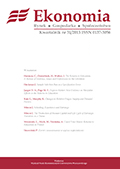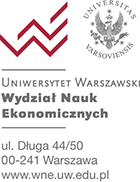Introdukcja euro w perspektywie akcesji i wyzwań absorpcji
K. Dąbrowska-Gruszczyńska, M. Gruszczyński
ABSTRAKT: The introduction of the euro is one of the elements of wider strategy of EU integration. After the accession the new member countries tested significant and rapid inflow of portfolio and direct investments. This Inflow—paradoxically— may make it difficult to introduce a common currency. It is additionally strengthened by the ineffectiveness of the exchange rate mechanism. This ineffectiveness may cause that the rate of exchange can be recognized as guaranteed, taking the currency risk off the market participants who invest in the assets denominated in the currencies of the new member countries or raise a credit in the foreign currency. This causes—short and long term—inflow of the investments, and at the same time bigger pressure of appreciation of these currencies. The effect of the inflow, except the real and the nominal appreciation, is additional inflationary pressure. The thesis advanced by the authors is that, after the asset there is a change of efficiency of the rate of the exchange in Poland, Czech Republic and Hungary. The weekly courses such as EUR/PLN, EUR/CZK, EUR/HUF were examined. The correlations of delays were tested and the Ljunga-Boxa autocorrelation (Q) as well.
Pełny tekst (PDF)
Numer wydania: 22
W numerze:
Racjonalność przestrzennej alokacji środków finansowych na ochronę środowiska w Polsce
K. Berbeka
ABSTRAKT |
PDF
The aim of this article is the analysis of the selected factors influencing the allocation of investment outlays (focusing on environment protection) in Poland. The primary hypothesis assumed that the allocation depends on: expected benefits caused by new investments, duties implicated by EU law, quality of the environment. The review of mentioned factors indicated that the first two related to benefits and duties imposed by EU law were not really important. Also the correlation between quality of environment and amount of investment was relatively strong only for national sources of the capital. There was no correlation at all between the environment quality and preliminary allocation of EU funds.
Jakość i efektywność w administracji samorządowej - podejście metodologiczne
P. Modzelewski, K. Opolski
ABSTRAKT |
PDF
Requirements imposed on public administration make it necessary to use more perfect tools to assure its efficient functioning. The methodology of measuring the quality and efficiency in the local government administration is a creative synthesis of theory of the economy, administration and the phraseology as well. It is necessary to define a lot of aspects connected with the aims of public administration and to introduce variables which can be used in empirical investigations at offices of the local government administration. This article deals with the ways of measuring organizational effectiveness of the local departments and with the measurement of the quality of the public services concerning requirements of the quality management system. The possibility of using methods of measuring the efficiency of allocation of resources, scale efficiency and technical effectiveness was shown. The efficiency and quality of the local departments was compared. Presented methods of the measurement make it possible to check the results how the local government administration functions, however they may also be implemented in the central level of administration.
Introdukcja euro w perspektywie akcesji i wyzwań absorpcji
K. Dąbrowska-Gruszczyńska, M. Gruszczyński
ABSTRAKT |
PDF
The introduction of the euro is one of the elements of wider strategy of EU integration. After the accession the new member countries tested significant and rapid inflow of portfolio and direct investments. This Inflow—paradoxically— may make it difficult to introduce a common currency. It is additionally strengthened by the ineffectiveness of the exchange rate mechanism. This ineffectiveness may cause that the rate of exchange can be recognized as guaranteed, taking the currency risk off the market participants who invest in the assets denominated in the currencies of the new member countries or raise a credit in the foreign currency. This causes—short and long term—inflow of the investments, and at the same time bigger pressure of appreciation of these currencies. The effect of the inflow, except the real and the nominal appreciation, is additional inflationary pressure. The thesis advanced by the authors is that, after the asset there is a change of efficiency of the rate of the exchange in Poland, Czech Republic and Hungary. The weekly courses such as EUR/PLN, EUR/CZK, EUR/HUF were examined. The correlations of delays were tested and the Ljunga-Boxa autocorrelation (Q) as well.
Four Years After Expansion: Are Czech Republic, Hungary and Poland Closer to Core or Periphery of EMU?
M. Łupiński
ABSTRAKT |
PDF
In this paper we try to check readiness of three Central and Eastern Europe countries, Czech Republic, Hungary and Poland, to introduce European single currency, euro. As a background in the macroeconomic field we use Optimal Currency Area Theory and in the mathematical field three procedures and models: Stock and Watson unobserved component model, spectral and cross-spectral analysis and cluster analysis. Achieved results allow us to state that four years after EU expansion three new countries are rather similar to EMU periphery countries like Italy, Portugal, Spain and Greece than to EMU core economies like Austria, Belgium, Denmark, Germany France and Netherlands.
Badanie wpływu filantropii na wizerunek przedsiębiorstwa
M. Majchrzak
ABSTRAKT |
PDF
Consumers behaviour research is essential for both: the economist and the customer, who can often understand his own choices. The customer is mainly concentrated on the empirical investigation, physical features of the product and the knowledge about the product. However the economist's approach is the analysis on the higher level of factors, which indirectly and at the same time strongly influence customers' decisions. Considering this facts, it is going to be checked if, in the way to become the leader, joining the economic activities with the public work is respected by receivers of this philanthropy. Moreover the work will contain the answer to the question if the public work and pro-ecological actions make the company reliable and if it has an influence on the customer’s opinion about the company and its products.
Preferencyjna polityka podatkowa w specjalnych strefach ekonomicznych a budżet lokalny
J. Nowakowska
ABSTRAKT |
PDF
The aim of this article is to assess the impact of the tax… in the special economic zones on the state of finances of territorial council. The investigation was based on the example of first Polish special economic zone—the SSE Euro—Park Mielec. The period of functioning of the zone in Mielec was described from the point of its establishment in 1995.
The analysis which was carried out showed that it is not essential for the local budget if the zone inventors have the tax exemption. What is more, it was noticed that there was a notable growth of budget's income from the income taxes and real estate taxes. It was the result of the dynamic development in enterprise in the region of collapsing industry. The inflowing investors to the zone of Mielec, who were encouraged by the given tax privileges, contributed the formation of next companies in the area. The SSE Euro—Park Mielec ended the monoculture of the industry through the diversification of the structure of industry. However its most important contribution was overcoming the crisis on the labour market—unemployment rate is nowadays less than the average for Poland and Podkarpackie province.
The example of Mielec confirms the high effectiveness of the special economic zones as the stimulating instrument of economic development, particularly on the regional level. Preferential tax policy had consequences in the economic promotion of regions in Poland, not only in the country, but abroad as well.
Wycena czasu wolnego – podejście eksperymentalne
T. Gajderowicz
ABSTRAKT |
PDF
The paper takes the problem of difficulties in the valuation of leisure time within the context of methods used to estimate the value of non-market goods. The traditional methods were compared to the innovative approach of experimental economics. Two laboratory experiments were planned and carried out, and henceforth analyzed and critiqued. The influence of the size of the company on formation of the decision which location to choose.

